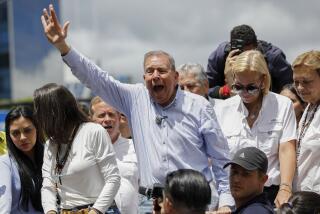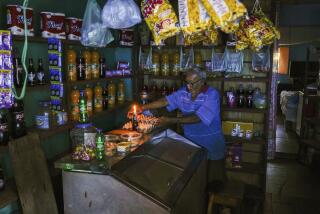Carlos Andres Perez dies at 88; former president of Venezuela
Carlos Andres Perez, a former president of Venezuela whose popularity soared with the country’s oil-based economy but who later faced riots, a severe economic downturn and impeachment, has died. He was 88.
Perez , who was having trouble breathing, was taken to a hospital in Miami, where he died Saturday of respiratory failure, said his daughter, Maria Francia Perez.
In his final years, Perez came to personify the old-guard Venezuelan political establishment bitterly opposed by current President Hugo Chavez. Perez survived two coup attempts in 1992, the first of which was led by Chavez, who was then a young Army lieutenant colonel.
In recent years, Perez lived in Miami while the Venezuelan government demanded he be turned over to stand trial for his role in repressing riots in 1989. Perez — who governed Venezuela from 1974 to 1979 and again from 1989 to 1993 — denied wrongdoing.
In his first term, he won praise by nationalizing Venezuela’s oil industry, paying off foreign oil companies and then capitalizing on a period of prosperity that allowed his government to build subway lines, bankroll social programs and set up state-run companies in areas such as steel and electricity.
He became one of Latin America’s most prominent political leaders and Venezuelans elected him for a second time in 1988, hoping for a return to good times after a decade of economic decline.
But his popularity plunged when he tried to push through an economic austerity program that included increasing the subsidized prices of gasoline. Anger among the poor boiled over in the 1989 riots.
More than 300 people were killed in the unrest known as the “Caracazo.” Some activists put the toll much higher. Prosecutors accused Perez of ordering a harsh crackdown during the unrest, when rights activists say many were shot indiscriminately by security forces.
Perez stopped speaking in public after a 2003 stroke but maintained his innocence.
Congress impeached Perez on corruption charges in 1993, and he was under house arrest until 1996. The Supreme Court convicted him that year of misspending $17 million in public funds — a charge he always denied.
One of 12 sons of a farmer and a merchant, Perez was born in 1922 in Rubio, Venezuela. He married a cousin, Blanca Rodriguez, with whom he had six children.
In later years, he had two children with his longtime mistress and secretary, Cecilia Matos, whom he married.
Perez began his political career in 1941. He quickly ascended in the Democratic Action Party, one of two parties that governed the nation for 40 years after the fall of Gen. Marcos Perez Jimenez’s dictatorship in 1959.
Even as Perez faced domestic troubles in his final years in power, he played the statesman internationally.
He helped promote talks to end conflicts in Central America in the 1980s, and when Haitian President Jean-Bertrand Aristide was ousted in 1991, he sent a plane for him. At the time, then-U.S. President George H.W. Bush called Perez one of the hemisphere’s great democratic leaders.
More to Read
Start your day right
Sign up for Essential California for the L.A. Times biggest news, features and recommendations in your inbox six days a week.
You may occasionally receive promotional content from the Los Angeles Times.






